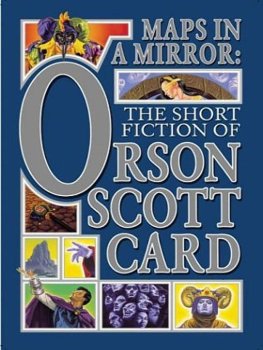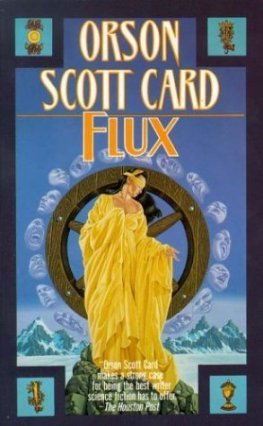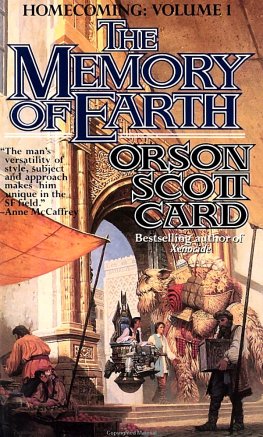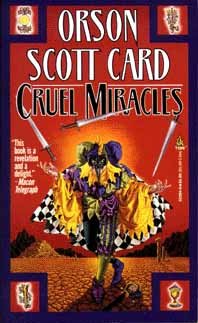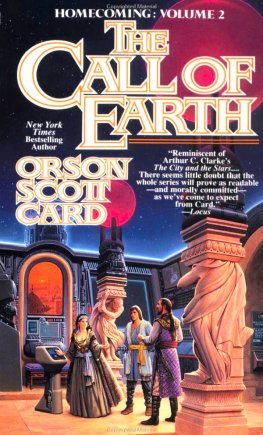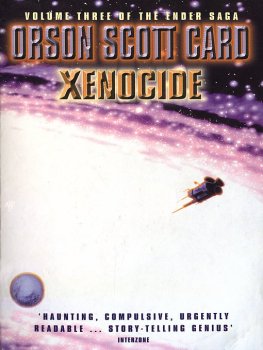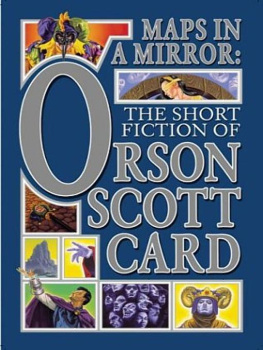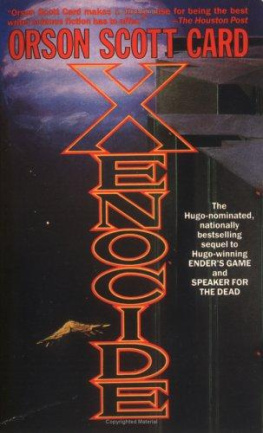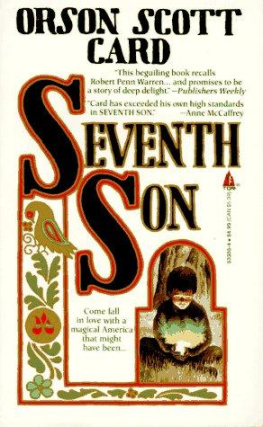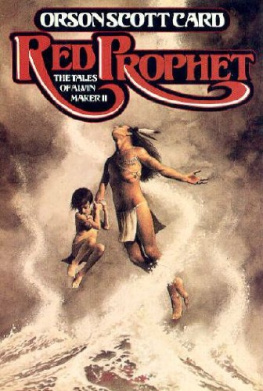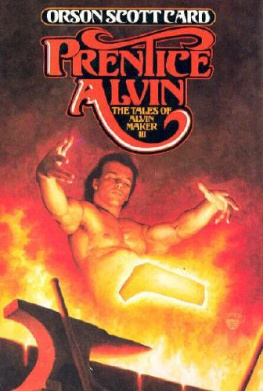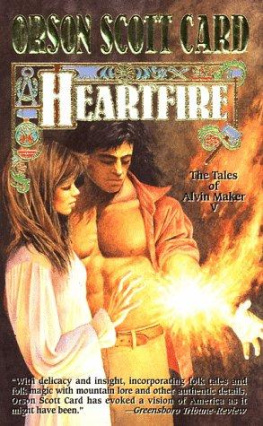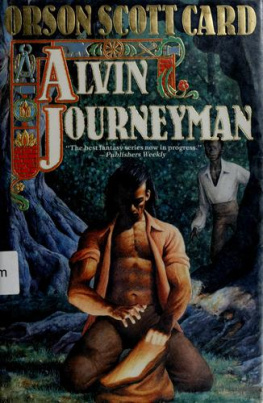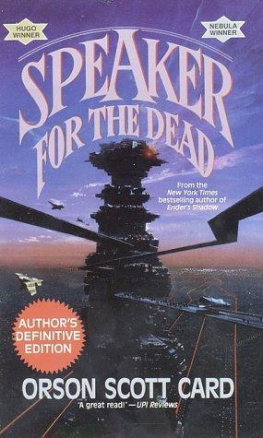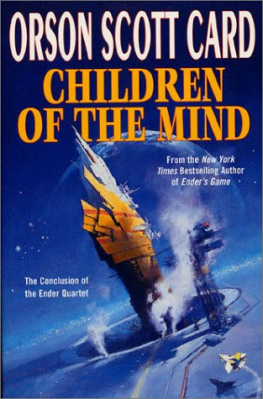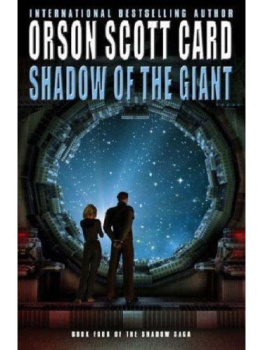MAPS IN A MIRROR
The Short Fiction of Orson Scott Card
To Charlie Ben,
who can fly
BOOK 1
THE HANGED MAN
TALES OF DREAD
I cant watch horror or suspense movies in the theatre. Ive triedbut the tension becomes too much for me. The screen is too large, the figures are too real. I always end up having to get up, walk out, go home. Its more than I can bear.
You know where I end up watching those movies? At home. On cable TV. That little screen is so much safer. The familiar scenes of my home surround it. And when it gets too tense, I can flip away, watch reruns of Dick Van Dyke or Green Acres or some utterly lame depression-era movie until I calm down enough to flip back and see how things turned out.
Thats how I watched Aliens and The TerminatorI never have watched them beginning-to-end. I realize that by doing this Im subverting the filmmakers art, which is linear. But then, my TVs remote control has turned viewing into a participatory art. I can now perform my own recutting on films that are too upsetting for my taste. For me, Lethal Weapon is much more pleasurable when intercut with fragments of Wild and Beautiful on Ibiza and Life on Earth.
Which brings us to the most potent tool of storytellers. Fear. And not just fear, but dread. Dread is the first and the strongest of the three kinds of fear. It is that tension, that waiting that comes when you know there is something to fear but you have not yet identified what it is. The fear that comes when you first realize that your spouse should have been home an hour ago; when you hear a strange sound in the babys bedroom; when you realize that a window you are sure you closed is now open, the curtains billowing, and youre alone in the house.
Terror only comes when you see the thing youre afraid of. The intruder is coming at you with a knife. The headlights coming toward you are clearly in your lane. The klansmen have emerged from the bushes and one of them is holding a rope. This is when all the muscles of your body, except perhaps the sphincters, tauten and you stand rigid; or you scream; or you run. There is a frenzy to this moment, a climactic powerbut it is the power of release, not the power of tension. And bad as it is, it is better than dread in this respect: Now, at least, you know the face of the thing you fear. You know its borders, its dimensions. You know what to expect.
Horror is the weakest of all. After the fearful thing has happened, you see its remainder, its relics. The grisly, hacked-up corpse. Your emotions range from nausea to pity for the victim. And even your pity is tinged with revulsion and disgust; ultimately you reject the scene and deny its humanity; with repetition, horror loses its ability to move you and, to some degree, dehumanizes the victim and therefore dehumanizes you. As the sonderkommandos in the death camps learned, after you move enough naked murdered corpses, it stops making you want to weep or puke. You just do it. Theyve stopped being people to you.
This is why I am depressed by the fact that contemporary storytellers of fear have moved almost exclusively toward horror and away from dread. The slasher movies almost dont bother anymore with creating the sympathy for character that is required to fill an audience with dread. The moments of terror are no longer terrifying because we empathize with the victim, but are rather fascinating because we want to see what creative new method of mayhem the writer and art director have come up with. Ahmurder by shish-ka-bob! Oh, coolthe monster poked the guys eye out from inside his head!
Obsessed with the desire to film the unfilmable, the makers of horror flicks now routinely show the unspeakable, in the process dehumanizing their audience by turning human suffering into pornographically escalating entertainment. This is bad enough, but to my regret, too many writers of the fiction of fear are doing the same thing. They failed to learn the real lesson of Stephen Kings success. It isnt the icky stuff that makes Kings stories work. Its how much he makes you care about his characters before the icky stuff ever happens. And his best books are the ones like The Dead Zone and The Stand in which not that much horror ever happens at all. Rather the stories are suffused with dread leading up to cathartic moments of terror and pain. Most important, the suffering that characters go through means something.
That is the artistry of fear. To make the audience so empathize with a character that we fear what he fears, for his reasons. We dont stand outside, looking at a gory slime cover him or staring at his gaping wounds. We stand inside him, anticipating the terrible things that might or will happen. Anybody can hack a fictional corpse. Only a storyteller can make you hope the character will live.
So: I dont write horror stories. True, bad things happen to my characters. Sometimes terrible things. But I dont show it to you in living color. I dont have to. I dont want to. Because, caught up in dread, youll imagine far worse things happening than I could ever think up to show you myself.
EUMENIDES IN THE FOURTH FLOOR LAVATORY
Living in a fourth-floor walkup was part of his revenge, as if to say to Alice, Throw me out of the house, will you? Then Ill live in squalor in a Bronx tenement, where the toilet is shared by four apartments! My shirts will go unironed, my tie will be perpetually awry. See what youve done to me?
But when he told Alice about the apartment, she only laughed bitterly and said, Not anymore, Howard. I wont play those games with you. You win every damn time. She pretended not to care about him anymore, but Howard knew better. He knew people, knew what they wanted, and Alice wanted him. It was his strongest card in their relationshipthat she wanted him more than he wanted her. He thought of this often: at work in the offices of Humboldt and Breinhardt, Designers; at lunch in a cheap lunchroom (part of the punishment); on the subway home to his tenement (Alice had kept the Lincoln Continental). He thought and thought about how much she wanted him. But he kept remembering what she had said the day she threw him out: If you ever come near Rhiannon again Ill kill you.
He could not remember why she had said that. Could not remember and did not try to remember because that line of thinking made him uncomfortable and one thing Howard insisted on being was comfortable with himself. Other people could spend hours and days of their lives chasing after some accommodation with themselves, but Howard was accommodated. Well adjusted. At ease. Im OK, Im OK, Im OK. Hell with you. If you let them make you feel uncomfortable, Howard would often say, you give them a handle on you and they can run your life. Howard could find other peoples handles, but they could never find Howards.
It was not yet winter but cold as hell at three A.M. when Howard got home from Stus party. A must attend party, if you wished to get ahead at Humboldt and Breinhardt. Stus ugly wife tried to be tempting, but Howard had played innocent and made her feel so uncomfortable that she dropped the matter. Howard paid careful attention to office gossip and knew that several earlier departures from the company had got caught with, so to speak, their pants down. Not that Howards pants were an impenetrable barrier. He got Dolores from the front office into the bedroom and accused her of making life miserable for him. In little ways, he insisted. I know you dont mean to, but youve got to stop.
What ways? Dolores asked, incredulous yet (because she honestly tried to make other people happy) uncomfortable.

